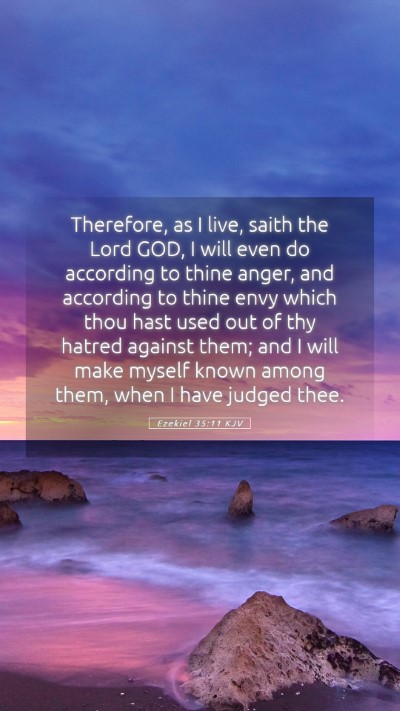Bible Verse Interpretation for Ezekiel 35:11
Ezekiel 35:11 states: "Therefore, as I live," says the Lord God, "I will deal with you according to your anger and according to your envy which you showed in your hatred against them; and I will make myself known among them when I judge you."
This verse is a critical component of prophetic literature that addresses the consequences of animosity and hatred. To provide a comprehensive understanding, we will explore insights derived from various public domain commentaries.
Understanding the Context
The Book of Ezekiel is a prophetic text that deals with the judgment of nations. In chapter 35, the focus is particularly on Edom, a nation that harbored deep-seated hatred towards Israel. Ezekiel, acting as a mouthpiece for God, declares impending judgment on Edom for their wrongdoing.
Insights from Matthew Henry
Matthew Henry emphasizes the notion of divine justice in this passage. He notes that God’s judgment is not arbitrary but is directly correlated to the actions and intentions of nations:
- Retributive Justice: God promises to handle Edom according to the anger and envy they displayed towards Israel.
- Public Revelation: The verse highlights that God will make Himself known through the act of judgment, reinforcing His sovereignty.
Albert Barnes' Commentary
Albert Barnes provides a detailed analysis of the motivations behind God’s judgment:
- Hatred and Envy: He points out that Edom's hatred was not merely personal but rooted in a broader animosity against God's chosen people.
- An Assurance of Divine Presence: The declaration that God will make Himself known signifies that God is aware and will act decisively against evil.
Adam Clarke's Insights
In his commentary, Adam Clarke takes a closer look at the implications of God's judgment:
- God's Immovable Position: Clarke stresses that God’s promise of retribution is a reaffirmation of His commitment to justice.
- Implications for Believers: The verse serves as a reminder for individuals to be mindful of their attitudes towards others, highlighting the spiritual principle of harvest—what one sows, one shall reap.
Modern Application
The verse's relevance can extend beyond its historical context and into present-day applications:
- Dealing with Anger: It teaches that harboring anger and envy can lead to divine consequences, thus promoting emotional wellness.
- Importance of Forgiveness: Understanding the former animosities can guide individuals in resolving conflicts in contemporary society.
Cross-References
This verse echoes themes found in several other Biblical passages:
- Obadiah 1:10-14 - God's judgment on Edom for violence against Jacob.
- Isaiah 34:5-8 - The Lord's vengeance on nations.
- Proverbs 14:30 - The destructive nature of envy.
Conclusion
The profound implications of Ezekiel 35:11 offer insights into God’s character as just and sovereign, while also serving as a poignant reminder of the consequences of human emotions like hatred and envy. Through careful analysis, believers can grasp the timeless lessons of scripture and apply them to their daily lives.


